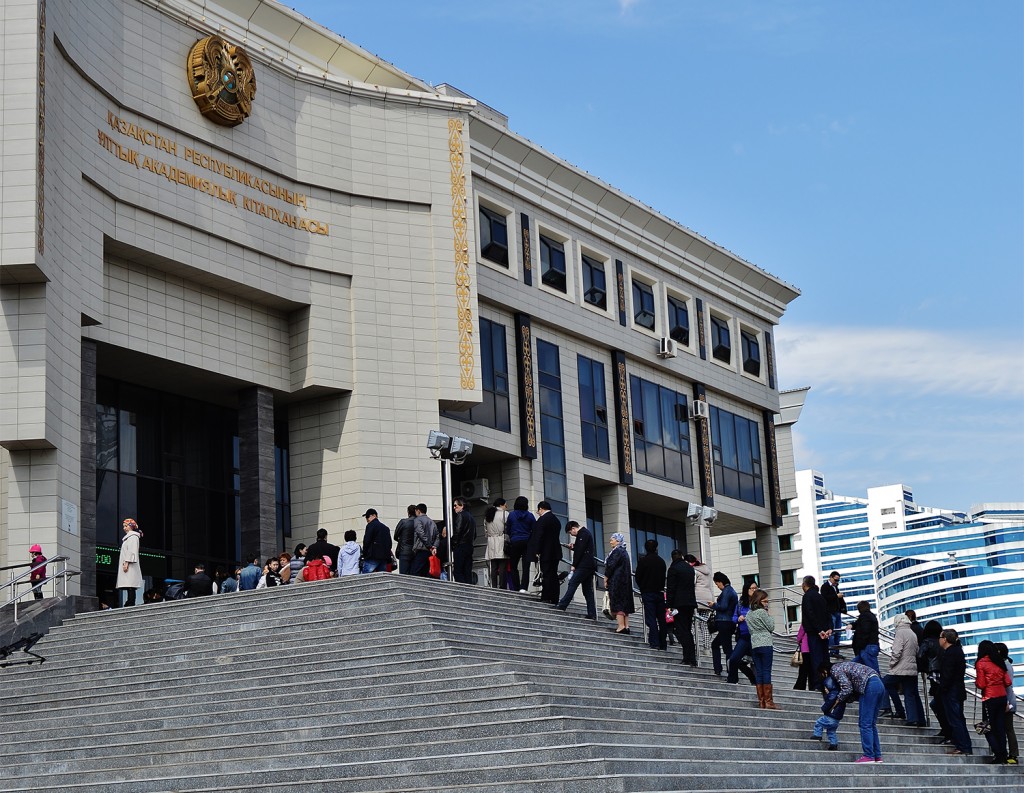ASTANA – As voting was held throughout the day on April 26, a number of international observers shared their initial impressions with local media.
 Italian legislator, who recently served as President of the Parliamentary Assembly of the Organisation of Security and Cooperation in Europe, Riccardo Migliori, commended the transparency of the Kazakh election.
Italian legislator, who recently served as President of the Parliamentary Assembly of the Organisation of Security and Cooperation in Europe, Riccardo Migliori, commended the transparency of the Kazakh election.
“I have helped monitor elections in more than 30 countries. However, I can say that your election is more transparent than those that recently took place in the USA,” he told the Kazakh media. According to him, the American people chose from four candidates, but people really only knew two of them, as there are “no limits on spending” for electoral campaigns.
“At the moment, I can say that we are very glad about how the election is being run in your country. I believe that this election is being conducted more transparently than those in the USA, despite it being considered the country where democracy is strongest,” Migliori stated, as quoted by Vlast.kz.
Former U.S. Representative Steve Stockman (R-Texas) welcomed the openness of the electoral process and the transparency of voting procedures at the polling stations he witnessed. According to him, the election had a “festive” nature and is enjoyed a high turnout.
Jacob Zenn, a Washington-based Eurasian affairs analyst at the Jamestown Foundation, said that judging by the several polling stations that he had visited, everything was well organised and that he was able to get the questions he asked answered. The high turnout that he witnessed testifies to the “importance this election has to the people of Kazakhstan.”
“In every country, election quality shows how developed democracy there is. Comparing modern Kazakhstan to what it was twenty years ago, we can talk about progress in building democratic institutions,” he said, according to www.ortcom.kz.
Stjepan Mesic, ex-president of Croatia, commended the “very good” organisation of the election. Nevertheless, he said he did not personally see the local tradition of playing background music at polling stations, stations offering tea and snacks and the giving of congratulations and gifts to first-time voters and people celebrating birthdays.
Ivo Slaus, a Croatian scholar and member of the Pugwash Conferences on Science and World Affairs, noted that the polling process in Kazakhstan coincided with international standards, adding that he was impressed with the accomplishments achieved by Kazakhstan under the leadership of incumbent President Nursultan Nazarbayev.
Juris Paiders, representing Latvian media outlet www.nra.lv, congratulated Kazakhstan on its election, calling it “a very important democratic event.”
Commenting on his impressions, he made the argument that one should not judge an election on cultural differences, specifics and traditions. Democracies have various ways of evolving and each nation should be free to choose its own path, he said. The most important thing is that the results of an election reflect the people’s will.
The Latvian journalist also recommended that Kazakh electoral authorities stamp ballot papers marking the polling station at which the vote was cast. This could help prevent potential cheaters from undermining the voting process, he argued. In general, Kazakhstan could serve as a good model for other neighbouring states, Paiders said.
Professor at the London Academy of Diplomacy Joseph Mifsud said that after speaking with a number of people running the polling stations and to some of those voting, he had a strong idea of how the elections were being carried out. As someone who has “witnessed other EU and non-EU election processes,” he said that voting in Kazakhstan “is being conducted in a normal manner.”
Rupert Goodman of Great Britain’s FIRST Magazine commented that he visited five randomly chosen polling stations located on the outskirts of Astana.
“There was no forewarning of our impending visit; therefore,we could make objective observations as to what was happening at the polling stations.”
The overall impression was that the polling stations were “very busy and orderly and were filled with voters who seemed genuinely pleased to be exerting their democratic right to vote and were indeed part of the electoral process.” From his exchanges with a number of polling station heads, who “were eager to explain the process to us and were very open,” it was clear to him that these people “had already undergone proper training, meaning that there was real professionalism about the conduct at these polling stations,” he said.
“I did not observe anything that led me to question the integrity of the voting process. Everything is being conducted, from what we have observed, in an entirely orderly and proper manner,” he concluded.
Tchetin Kazak, member of the National Assembly of Bulgaria, said he had not noted any irregularities in the voting processes. The observer welcomed the strong youth participation, which recently has become more of a rarity in Europe. He said that he hoped that the country, with its diverse population, both ethnically and religiously, would make good decisions that would ensure domestic accord and social progress.
A record of 95.11 percent of registered voters had cast their ballots, the Central Electoral Commission announced about two hours after the voting ended in Astana.
Three candidates were in the running: incumbent Nursultan Nazarbayev, Turgun Syzdykov of the Communist People’s Party and self-nominee, leader of the Federation of Trade Unions Albelgazy Kussainov.
The country has 9,514,988 adult citizens eligible to vote at one of 9,741 polling stations. Approximately 69,750 members of electoral commissions are involved in counting ballots.
